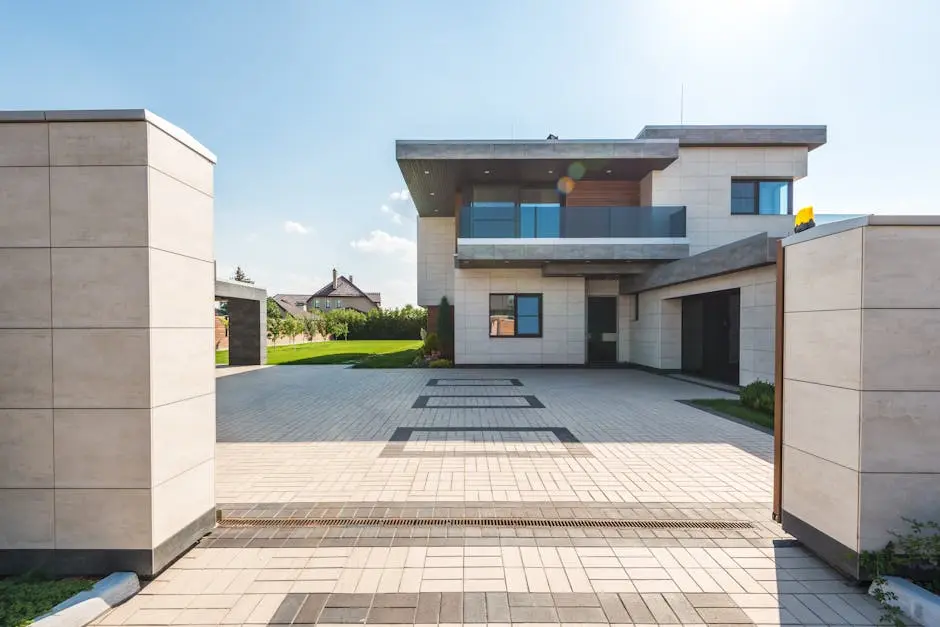Choosing the right driveway pavers can be a daunting task, given the myriad of options available in the market. In this guide, we’ll walk you through the fundamental aspects to consider, ensuring that your driveway not only complements your home but also stands up to time and weather.
Understanding Different Types of Pavers
When it comes to paving your driveway, there are several excellent options to consider. Concrete pavers are a popular choice due to their durability and versatility. They are available in a variety of shapes, sizes, and colors, which allows for a customized look. Furthermore, concrete pavers tend to have a lower initial cost compared to other materials, making them a budget-friendly option. However, they may crack under extremely heavy loads or shifts in temperature.
Next up is brick pavers, which offer a classic and timeless appeal. Made from natural clay, these pavers are eco-friendly and retain their color over time, resisting the fading that plagues other materials. Brick pavers are highly durable and can withstand heavy loads, but they do require more maintenance to keep them in peak condition. Regular sealing can enhance their longevity and maintain their vibrant appearance.
Natural stone pavers offer unmatched beauty and luxury. Materials like granite, slate, and limestone provide a unique and elegant look with their rich, earthy tones. The natural variation in stone adds character to the driveway, making every installation unique. However, they are often more expensive and require professional installation to handle their weight and intricacy.
Factors to Consider When Choosing Driveway Pavers
One of the most important aspects to consider is the climate in which you live. For instance, areas with heavy rainfall or frequent freeze-thaw cycles will require pavers that are water-resistant and won’t easily crack or shift. In such conditions, permeable pavers can be an ideal choice as they allow water to seep through, reducing the risk of erosion or pooling.
Considering the cost and budget is also a critical part of the decision-making process. It’s important to factor in not only the initial cost of the materials and installation but also long-term maintenance expenses. While some pavers might be more costly upfront, they could offer savings in maintenance or replacement costs down the line.
Design and Style Considerations
Choosing driveway pavers that enhance your home’s architectural style is crucial for a cohesive look. For a modern home, sleek concrete pavers might be a great choice. For more traditional homes, brick or cobblestone pavers might complement the aesthetic better with their classic appeal.
Patterns and layout also play a significant role in the final appearance of your driveway. Whether you opt for a herringbone pattern, which offers great interlock and a classic look, or the modern appeal of a stack bond pattern, these choices will impact the overall ambiance and functionality of the space. Experimenting with different arrangements can transform the driveway into a work of art that reflects your personal taste.
Installation and Maintenance Tips
Installing pavers correctly is crucial for achieving a durable and attractive driveway. Begin with a well-prepared base that ensures stability. The base should be properly compacted and leveled, which is key for preventing future settling or water pooling. While many might opt for a DIY approach, hiring professionals ensures the job is done right, especially for more intricate designs or heavier materials like natural stone.
Once installed, regular maintenance can significantly extend the lifespan of your pavers. Sealing is one of the best ways to protect against stains and weather-related damage. Additionally, replacing damaged pavers promptly prevents more extensive repairs and helps maintain an even surface, contributing to both aesthetics and safety.
Making the Best Choice for Your Driveway
Selecting the right driveway pavers involves balancing aesthetics, functionality, and durability. By understanding your specific needs and considering various materials, you can make an informed choice that enhances your home’s curb appeal while providing long-lasting service.





